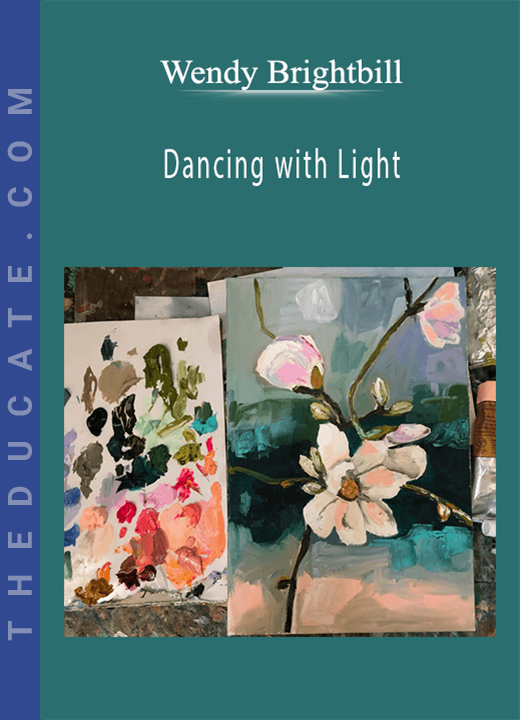Description
Wendy Brightbill – Dancing with Light
There is something magical about the luminosity of oil paints. It’s captivating and breath taking. A camera can’t really capture the way that the light catches and moves across an oil painting. And an oil painting changes in different light throughout the day.
I reluctantly began my journey into painting with oils. I had come to a place in my creative practice where I felt like I was hitting a wall in what I could do with acrylic paint. The work that I was doing required many, many layers of acrylic paint. But I also felt limited by the mediums I was using. I couldn’t work fast enough and often was mixing many shades of the same color just to get the desired dimension that I wanted. I remember showing a friend some of my work. She thought that I was using oils to create my paintings and was surprised that I was getting such dynamic results with acrylics. This friend then encouraged me to venture into oil painting since the result I was trying to get was easily accomplished with oils.
But OILS?!? Seriously? I had so many reservations!!! Probably some of the same reservations that you might have. Too messy. Too smelly. Too long to dry. Too toxic. And while I do think that these are all valid objections, oil paint gets a bad rap.
Yes they are messy but with a little planning you can maneuver around this.
They do take a long time to dry but you get used to it. And because of this, you get way more blending time (which is a really good thing).
The toxicity is a concern but, it’s really not much different than acrylics. For example, the pigments that are toxic in oils are the same in acrylics. Oils are often toxic because of the solvents (turpentine) that people use with them. I don’t use a lot of solvents in my work. (The solvents are the things that you add to oils to thin them out more.) And you can use water soluble oils which would mean you wouldn’t need to use a solvent at all. I don’t use turpentine to clean my brushes. I use Gamsol and sometimes just wet wipes. Gamsol is much less toxic than turpentine. Regardless, if you are concerned about the toxicity, there are precautions that you can take to make it less so. Work with ventilation and wear gloves.
There is a huge learning curve for painting with oils! I remember feeling a little bit like I had to relearn the whole entire process of painting when I first started playing with oils. I was so used to working with acrylics and painting with layers. But what used to take me 8-10 layers of acrylic paint in a piece, now only takes me one layer of painting with oils. But beyond that, I love the depth of color you can get with a oil paint. There really is no substitute for it. After painting with oils for several years now, I look at an acrylic painting and it seems plastic and fake. I promise that I am not just a snooty oil painter either! Oils really are just more dynamic.
In this course we will explore all of the basics of painting with oils. Insider tips on the process of painting with oils. Watch me paint several paintings from start to finish. Still life, landscapes, and abstracts. I will specifically be focused on light and shadows in this course and how to capture it with oil paints. Here are some of the things that will be covered in this course:
- How to clean your brushes
- Planning out your pieces
- Detailed explanation of my favorite supplies and why
- Blending, blending and more blending
- Brushstrokes
- Palette knife work
- Under painting and when to use it
- Color and how to utilize it to create depth
- Composition and shape
Materials and Supplies:
Oil paints
Palette paper
Paintbrushes suitable for oil paint
Palette knives
Gamsol (for cleaning brushes)
Neo Meglip (solvent used for thinning)
Wet wipes
Oil pastels
Artist pencils
Graphite transfer paper
Oil painting paper by Strathmore
Acrylic paints for underpainting
Stretched canvas
Art boards
*My favorite oil paints are Charvin, Windsor Newton, Holbein, and Sennelier. Water soluble oil paint is welcome, just know that you might not be able to do as much palette knife painting with them because they aren’t quite as thick. I just started using Holbein’s water soluble paints and I love them.
Course Curriculum
First Section
Introduction and Materials (99:39)
Still Life Painting Part One (105:18)
Still Life Painting Part Two (61:52)
Still Life Painting Part Three (80:13)
Still Life Mini (62:53)
Abstract Floral (70:06)
Abstract and Floral Study (60:06)







11 reviews for Wendy Brightbill – Dancing with Light
There are no reviews yet.